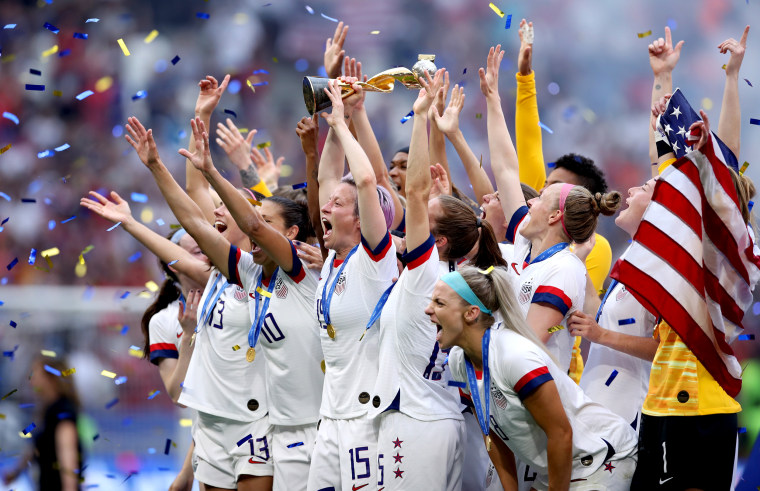America’s unwanted, uninterrupted culture war has finally infected soccer — a sport that most Americans don’t even really like. If that’s not the niftiest hat trick ever played, I don’t know what is (and if you don't know what a hat trick is, you really shouldn't have a dog in this fight).
The United States dominated the Women’s World Cup this year, taking home their second consecutive trophy and their fourth in the eight times the tournament has been played. In a normal, less intensely depressing time, a national sports triumph of this nature would be cause for patriotic displays of unity and celebration. Unfortunately, there is one thing Americans enjoy more than flaunting their global superiority: Yelling at women.
Commentators and cultural critics — those saintly people like myself who get paid to tell you why you’re wrong — are lining up to chastise or defend the overt, outward displays of joy and self-satisfaction from the U.S. Women’s National Team, led by the outspoken Megan Rapinoe, who famously told reporters that she was “not going to the f***ing White House” if they did, in fact, win the tournament. Supposed bastions of old-timey Protestant work ethic like well-known humble British person Piers Morgan said that Rapinoe’s beatific, defiant, heavily meme’d goal celebration against France and Alex Morgan’s tea-sipping gambol after scoring against England are an affront to traditional norms of sportsmanship.
Of course, the vision of “traditional sportsmanship,” that bygone image of a dusty baseball player trotting to solemnly shake the hand of his opponent like a Civil War reenactor on a rainy day, hasn’t usually included women. Women’s sports are considered a niche — a passion that people seem to discover only periodically.
This is especially true of women’s soccer, which might as well not exist for most critics during the four years between World Cups. The National Women’s Soccer League is a professional organization based in the United States for which many of your favorite national team stars play. That league is currently in-season, but you wouldn’t know it because we treat women’s professional sports worse than competitive eating or Monster Jam.
Maybe that’s why culture warriors bit down so hard on this remarkable team’s penchant for outward displays of self-esteem.
Men’s sports enjoy a constant cultural penetration second only to the consumption of oxygen. We see images of men grandstanding, posturing, bat-flipping, sneering and professing their greatness every single day. NBA star Russell Westbrook pounds his chest or mimes rocking a baby to sleep. Lance Stephenson, most recently of the Los Angeles Lakers, strums on an invisible guitar after a made three-pointer. Green Bay Packers quarterback Aaron Rodgers made gesturing like he was wearing a pro wrestling championship belt into a minor trend. The NFL recently relaxed its regulations on excessive celebration, due to an outcry from fans who want to see the unbridled enthusiasm of the athlete.
And in men’s soccer, the goal celebrations seem to get more elaborate every year. LA Galaxy star Zlatan Ibrahimovic made a global brand out of openly declaring his personal superiority to any camera or audio recorder within this solar system. Soccer writers argue why Cristiano Ronaldo’s arrogance is a benefit to the Portuguese men’s national team.
It is true that there exists a contingent of traditionalist baseball players and critics who lament the more florid home run celebrations — Jose Bautista of the Toronto Blue Jays majestically flipping his bat in the 2015 American League playoffs, Los Angeles Dodger Max Muncy admiring his home run as though it was his child taking its first steps — but those people are increasingly seen as vestiges of a bygone era desperately clinging to their abacuses. The fact of the matter is that, not only are over-the-top celebrations of athletic prowess common among professional athletes, they are tacitly allowed if not encouraged by their leagues because fans love them … when they're men.
Social norms say women should pipe down and stay stowed away. They’re not our superstar athletes, on par with Michael Jordan or Lionel Messi or LeBron James. But they aren’t because we don’t allow them to be. Megan Rapinoe, though, showed us the depths of her charisma and soccer acumen for the last month. By simply being herself — an elite athlete with a captivating personality — she entered a different level of celebrity.
And this iteration of the U.S. women's team represents something meaningful for our time, much like the image of Brandi Chastain’s shirtless celebration of the U.S. win in the 1999 World Cup immediately burned itself into our collective consciousness 20 years ago. In this era of polarization, of athletes and journalists being told to “stick to sports” and eschew political statements or even celebrations of their own achievements while the rest of the planet seems to be unraveling, our women’s soccer team — many of them proud members of the LGBTQ community — stood defiant and unbowed; they became proverbial lighting rods. (And they did so while demanding equal pay for demonstrably better work than their male counterparts.)
The 2019 Women’s World Cup was a massive step forward for true equality of opportunity in sports. The American women outdid their male counterparts, who play a dispiriting, dreary brand of soccer and lost to Mexico in the Gold Cup Final on Sunday. The women captured our imagination with spirit and verve and passion; the men all but tripped over their own shoelaces. The more we let our female athletes be themselves in the same way as the men, the more we will appreciate what they can do. If Megan Rapinoe and company are able to get you to watch soccer, then they truly can do anything. Maybe they can even convince the U.S. Soccer Federation to offer them equal pay.



